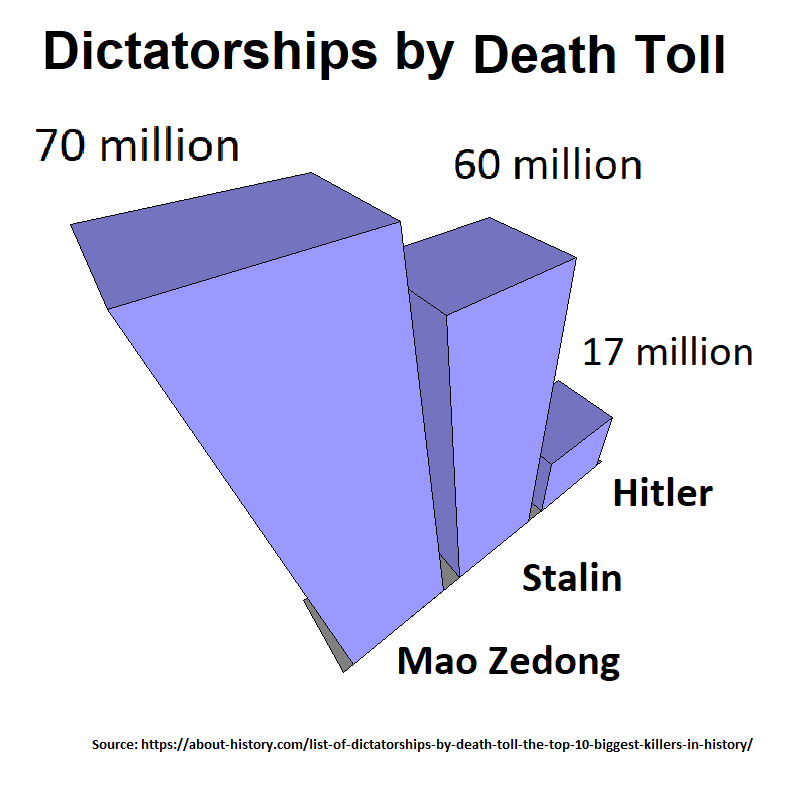Votto
Diamond Member
- Oct 31, 2012
- 63,066
- 68,547
- 3,605
I got to thinking, why is communism more politically correct than Nazism? Nazism is banned in entire countries, and in places like the US you become an outcast within society.
However, this is not the case with communism. On these boards, we have proud communists, but not so much when it comes to Nazism. In fact, leaning towards Communism is fairly common as we still have entire communist governments still in existence, but none are Nazis.
So which ideology is more evil? Consider this from Wiki.
Comparison of Communism and Nazism[edit]
Courtois considers Communism and Nazism to be distinct, but comparable totalitarian systems. He says that Communist regimes have killed "approximately 100 million people in contrast to the approximately 25 million victims of the Nazis".[6]:15 Courtois claims that Nazi Germany's methods of mass extermination were adopted from Soviet methods. As an example, he cites the Nazi SS official Rudolf Höss who organized the infamous extermination camp, Auschwitz concentration camp. According to Höss:[6]:15
The Reich Security Head Office issued to the commandants a full collection of reports concerning the Russian concentration camps. These described in great detail the conditions in, and organization of, the Russian camps, as supplied by former prisoners who had managed to escape. Great emphasis was placed on the fact that the Russians, by their massive employment of forced labor, had destroyed whole peoples.
Courtois argues that the Soviet crimes against peoples living in the Caucasus and of large social groups in the Soviet Union could be called "genocide" and that they were not very much different from similar policies by Nazis. Both Communist and Nazi systems deemed "a part of humanity unworthy of existence. The difference is that the Communist model is based on the class system, the Nazi model on race and territory".[6]:15 Courtois further stated:
The "genocide of a "class" may well be tantamount to the genocide of a "race"—the deliberate starvation of a child of a Ukrainian kulak as a result of the famine caused by Stalin's regime "is equal to" the starvation of a Jewish child in the Warsaw ghetto as a result of the famine caused by the Nazi regime.
He added:
After 1945 the Jewish genocide became a byword for modern barbarism, the epitome of twentieth-century mass terror. [...] [M]ore recently, a single-minded focus on the Jewish genocide in an attempt to characterize the Holocaust as a unique atrocity has also prevented the assessment of other episodes of comparable magnitude in the Communist world. After all, it seems scarcely plausible that the victors who had helped bring about the destruction of a genocidal apparatus might themselves have put the very same methods into practice. When faced with this paradox, people generally preferred to bury their heads in sand. [...] Communist regimes have victimized approximately 100 million people in contrast to the approximately 25 million of the Nazis.
However, this is not the case with communism. On these boards, we have proud communists, but not so much when it comes to Nazism. In fact, leaning towards Communism is fairly common as we still have entire communist governments still in existence, but none are Nazis.
So which ideology is more evil? Consider this from Wiki.
Comparison of Communism and Nazism[edit]
Courtois considers Communism and Nazism to be distinct, but comparable totalitarian systems. He says that Communist regimes have killed "approximately 100 million people in contrast to the approximately 25 million victims of the Nazis".[6]:15 Courtois claims that Nazi Germany's methods of mass extermination were adopted from Soviet methods. As an example, he cites the Nazi SS official Rudolf Höss who organized the infamous extermination camp, Auschwitz concentration camp. According to Höss:[6]:15
The Reich Security Head Office issued to the commandants a full collection of reports concerning the Russian concentration camps. These described in great detail the conditions in, and organization of, the Russian camps, as supplied by former prisoners who had managed to escape. Great emphasis was placed on the fact that the Russians, by their massive employment of forced labor, had destroyed whole peoples.
Courtois argues that the Soviet crimes against peoples living in the Caucasus and of large social groups in the Soviet Union could be called "genocide" and that they were not very much different from similar policies by Nazis. Both Communist and Nazi systems deemed "a part of humanity unworthy of existence. The difference is that the Communist model is based on the class system, the Nazi model on race and territory".[6]:15 Courtois further stated:
The "genocide of a "class" may well be tantamount to the genocide of a "race"—the deliberate starvation of a child of a Ukrainian kulak as a result of the famine caused by Stalin's regime "is equal to" the starvation of a Jewish child in the Warsaw ghetto as a result of the famine caused by the Nazi regime.
He added:
After 1945 the Jewish genocide became a byword for modern barbarism, the epitome of twentieth-century mass terror. [...] [M]ore recently, a single-minded focus on the Jewish genocide in an attempt to characterize the Holocaust as a unique atrocity has also prevented the assessment of other episodes of comparable magnitude in the Communist world. After all, it seems scarcely plausible that the victors who had helped bring about the destruction of a genocidal apparatus might themselves have put the very same methods into practice. When faced with this paradox, people generally preferred to bury their heads in sand. [...] Communist regimes have victimized approximately 100 million people in contrast to the approximately 25 million of the Nazis.
